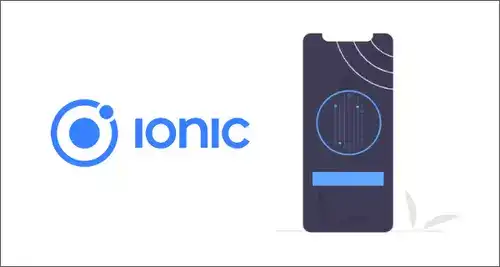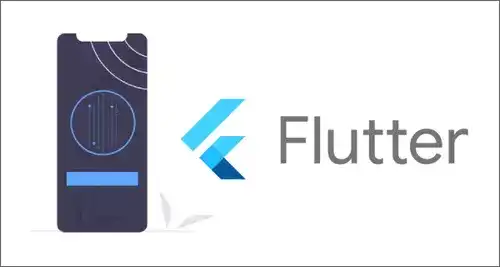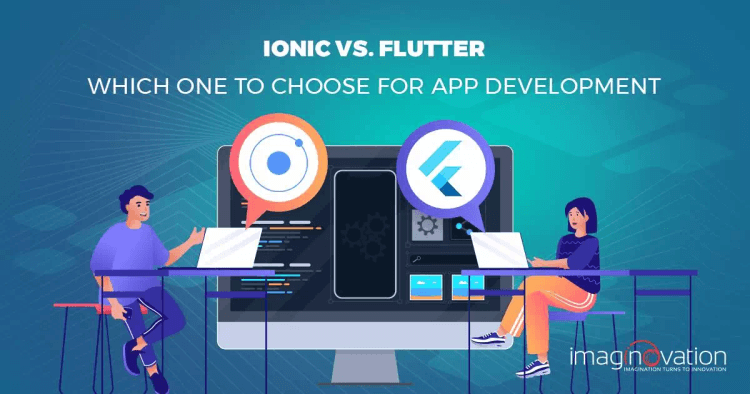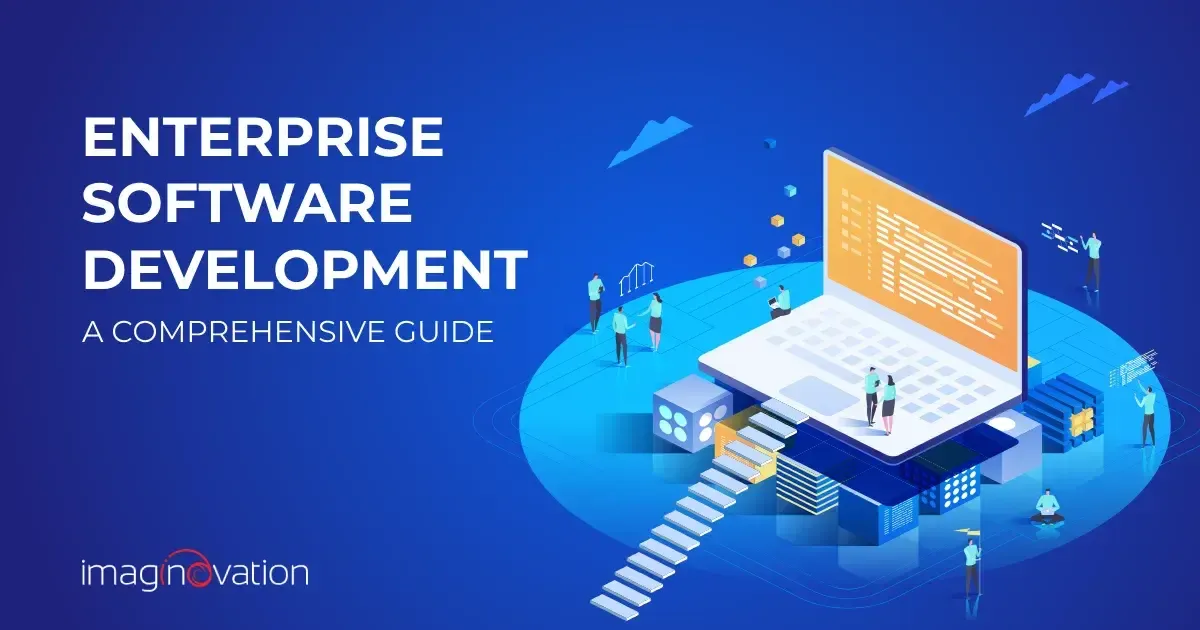To estimate the cost of building a website or an app, use our app cost calculator tool.
Ionic or Flutter, which one is the best for app development? Both Flutter and Ionic are used to build amazing cross-platform applications.
However, appreneurs may often find themselves in a dilemma on the platform selection. So, how to know which platform will be suitable for your application?
Well, it’s fun to explore the features, pros, and cons of both platforms before building your app. Plus, you may consider weighing the subtle differences between Ionic and Flutter and plot down the pros and cons.
For those who are excited to know the trends of Ionic vs. Flutter, this blog has some exciting insights for you. Keep reading—as we guide you on which framework is right for you.
Ionic vs. Flutter: The Key Differences
When it comes to developing any mobile app, it is critical to think of performance. It’s a no-brainer why high-performing apps are downloaded more and why users are glued to such apps.
So, if your app isn’t performing well, you are likely to have dissatisfied users, and you may end up losing valuable customers and ROI. The underlying framework used to build an app plays a crucial role in the performance.
Ionic Framework —is great for cross-platform app development as it can be used on multiple platforms using a single code base. For those who wish to build hybrid apps for web, native iOS, and Android platforms, Ionic can get you some brilliant results.
Flutter—uses Dart programming language developed by Google and uses many advanced features of popular programming languages. It is growing in popularity and offers some incredible cross-platform app development tools.
Also Read: Flutter App Development: Common FAQs Answered
Here are some factors to consider when choosing the best framework for your app development.
1. Programming language
Ionic uses web technologies, including JavaScript, HTML, and CSS. Plus, it requires a Cordova plugin to wrap the applications in native containers.
Flutter (as mentioned) uses Dart language, which is an object-oriented and multi-paradigm programming language. Dart is typically used for building apps for mobile, web, and desktop.
2. Performance
Often performance can be a critical factor when choosing the best framework. However, you must know that performance depends on many factors, including efficiency in code writing and more.
Ionic delivers excellent performance. However, Flutter has a slight edge as there is no native transition to connect with the native environment.
3. Community
Ionic has strong community support in comparison to Flutter. Ionic is built on AngularJS and has strong community support with a quick solution to errors and constant updates.
Flutter is relatively new, which makes it slightly less mature than its counterpart.
4. Architecture and Execution of code
Ionic extends the benefit of code reusability with one codebase. Its robust features and powerful community support facilitate developers to develop highly interactive apps in good time. One can also use Ionic with JavaScript, Angular, React, and Vue.
Flutter is an advanced and comprehensive language. With its engine, it can connect with platform-specific SDKs. The facet gives developers an exciting, reactive, and rich set of features that can boost mobile app experiences.
Also Read: Building A Scalable Mobile App Architecture for Large Projects
5. Popularity
Ionic is tremendously popular among web and mobile app developers because of the easy learning curve. Some tech giants using it are Pacifica, Nationwide, Sworkit, MarketWatch, and more.
Flutter is growing in popularity. It is used by Google Ads, Hamilton Musical, Alibaba, etc.
When to Choose Ionic for App Development?

Here’s the critical question: when to choose these frameworks? What is the best and when to use it?
Well, there isn’t one single answer to it.
At the core, one must understand that since each app requirement is distinct, one must select the framework that aligns with your business vision.
Ionic use is a wise call when one has strong developer expertise in using web technologies and Angular. Plus, when developers have experience in various JavaScript and Angular libraries, Ionic can augment the mobile app development process.
Ionic can help deliver an MVP, prototype, or demos for those who are looking at short development timeframes or excellent prototyping capabilities.
On the downsides, one needs to work more on security and optimization measures. Plus, if you are looking at developing mobile games or other applications that require extensive use of phone hardware, Ionic may not be a good idea.
Here are some other excellent reasons when you may want to choose Ionic for app development.
- Stability. It helps deliver stable, fast, and reliable products without burning a hole in your pocket, as Ionic is open source and free.
- Clean Default UI. For those looking at a clean default UI, where you can add a personal touch to your app with CSS classes, Ionic can help. One can also use forms, filters, list views, and other UI paradigms quickly to develop a brilliant app.
- Community Support. At times, it helps to have a vast and active community helping you on forums. Ionic is built on top of popular technologies such as Cordova and Angular and has an active community for support. So, one can expect quick responses to queries while developing apps.
- Code Reuse. When building high-end user interfaces with different functionalities, Ionic helps with such facets. Plus, one can reuse the same code to build apps for other platforms, saving time and effort.
- Develop High-Performing Apps. Ionic uses AngularJS, which provides application structure, and also allows you to build high-performance mobile apps.
- One code for all. It is easy to build cross-platform apps without any problem with Ionic as it offers flexibility with its one code for all features.
- Cordova Plugins. If your mobile app needs plugins that can enhance the overall performance of apps, having Cordova plugins with Ionic can help. The plugins give access to various operating system features, such as the battery, camera, pro-location, access to logs, and more. Such features can offer extra functionality and great-to-have during the development stage.
- Easy Testing. Yet another reason to choose Ionic is that mobile app testing is far easier with the framework. It is simple to test it on a desktop browser or perform simulator testing for iOS and Android apps using Cordova commands.
The bottom line, choose Ionic when developing hybrid mobile and web apps with great native power and control, with first-class support for PWAs.
When to Choose Flutter for App Development?

Now, let’s look at when you may choose Flutter for app development. Here are some compelling reasons:
- Stability. Flutter’s code is compiled into the ARM code when it comes to the CPU. So, Flutter apps are not affected by any OS update or system customization, which spells stability.
- Hot Reload. A unique feature to Flutter is where a developer can instantly see changes made to code with Hot Reload. What does this mean? Any updates are available to both designers and developers in seconds.
- Rich Standard Library. For developers looking at using a rich standard library, Flutter is a great option. As it uses Dart, an object-oriented programming language, one can access a library including garbage collection, generics, strong typing, and async-awaits.
- Custom Widgets. Yet, another compelling reason to use Flutter is the use of custom widgets. Developers get a flurry of widgets that help developers in their creation process.
- Consistent UI. When you are looking at consistent UI across iOS and Android, Flutter widgets can help you. Developers can look forward to building powerful user interfaces for mobile apps.
- Attract Investors with MVP. How about attracting more investors with an MVP? An MVP built on Flutter is compatible across different platforms and provides a high-quality user experience.
- BLoC Architecture Pattern. For apps with a complex architecture and a significant amount of data, Flutter may be a great choice. It uses the BLoC (Business Logic Components) architecture pattern to eliminate delays in the app’s performance by utilizing async methods, structuring, and streams.
- Pixel Perfect Apps. Yet another compelling reason to use Flutter is finding apps that look identical on all devices. So, for a pixel-perfect match, you can choose to use Flutter, which uses the Skia rendering engine, which supports iOS, Android, Windows, Ubuntu, and macOS.
The bottom line, choose Flutter when you are looking to develop a performant and scalable native cross-platform app in limited time and cost.
Flutter vs. Ionic: A Quick Comparison
Here’s a quick capture of the various parameters before choosing a framework.
Flutter vs. Ionic performance for app development is one tough decision, but when you weigh the parameters, it may help make an informed decision.
Table 1. Comparison of Ionic Vs. Flutter Features
| Parameter | Ionic | Flutter |
| Language(s) | HTML, CSS, JavaScript | Dart |
| UI elements | Standard-based web components | Proprietary widgets |
| Native API access | Native plugin library, using Cordova and Capacitor | Native plugin library, using Flutter native packages |
| Runtime | Web browser | Custom graphics machine |
| Offline access | Yes | Yes |
| Mobile performance | Very good | Excellent |
| Type | Software framework | Application framework |
| License | MIT License | New BSD License |
| Hot Reload | No | Yes |
| Performance | Moderate | Amazing controller |
| Testing | Any browser | Mobile device or emulator |
| Code reusability | 98% of code is reusable | 50-90% of code is reusable |
| Typical use cases | Hybrid app development, App with hardware functionality, MVC mobile apps, and more | MVP applications, Apps with material design, High-performance apps with a Skia rendering engine, and more |
| Popular apps | Diesel, Sworkit, Microsoft Flow, Pacifica, Just Watch | Google Ads, BMW, Tencent, KisterMe |
Pros and Cons of Using Ionic Framework
Let’s look at Ionic pros and cons.
Pros (Advantages) of Ionic
- It is easy to learn as one needs to have basic knowledge of HTML, CSS, or JavaScript technologies to build applications.
- It offers well-structured documentation to the developers.
- It supports the cross-platform feature, deploying the apps on multiple platforms with a single codebase.
- As it is built on Angular, it provides many functionalities to the developer for designing an application.
- It reduces developer time and effort to create a cross-platform mobile app. Plus, it gives a native look and feel.
- It saves build time with its simplistic interface for accessing native SDK and native API on each platform.
- It helps scale efficiently as the number of active users doesn’t affect its performance.
Cons (Disadvantages) of Ionic
- The security facet is slightly better in its native applications counterparts.
- The performance is yet another facet that needs improvement. However, the gap isn’t too noticeable for average users.
- It may not be your first go-to preference for high-end graphics-dependent apps.
- One may find many plugins with Ionic, but developers may still need to create some specific features.
- With no hot reloading, one may find plenty of refreshes whenever the developer makes some changes, which affects the development speed.
- Ionic may not be very suitable for memory-intensive or complex applications as it uses WebView to render apps. Plus, using it to build heavy applications may make the app crawl.
Pros and Cons of Using Flutter Framework
Let’s look at Flutter’s pros and cons.
Pros (Advantages) of Flutter
- It has the edge over other native applications as it is backed by Google.
- With its hot reloading feature, it augments the app development process. The feature helps with reflecting changes immediately without losing the application state.
- It reduces the time and effort of testing due to the cross-platform feature. The feature allows testers to not run the same set of tests on various platforms for the same application.
- One can enjoy the excellent UI because it uses a design-centric widget, advanced APIs, high-development tools, and more. It offers rich widgets that follow the guidelines of Cupertino (iOS) and Material Design (Android).
- Developers don’t need to update the UI content manually.
- Re-writing code isn’t required as it easily integrates with Java for Android and Swift or Objective C for iOS.
- It offers quick iteration cycles, saving build time as testing is required only for one single codebase.
- It makes it ideal for MVP development with its ability to write codes that can be shared across platforms easily.
Cons (Disadvantages) of Flutter
- It may have a slightly extended learning curve if developers aren’t aware of Dart programming for coding. As Flutter supports Dart, developers may need to learn the new technology.
- As Flutter is comparatively new, its community support is still growing.
- It offers limited access to SDK libraries, which means a developer does not have many functionalities to create a mobile app. Though the libraries and tools are impressive, it’s not as rich as Ionic.
- One may face glitches with vector graphics and animation support having issues in rendering plugins on time.
- It is not compatible with developing apps for tvOS, Android Auto, CarPlay, or watchOS.
- One cannot instantly push patches and updates into applications without passing through the standard release processes.
Wrapping Up
Ionic and Flutter are excellent technologies when it comes to building cross-platform apps. While each has its strengths, similarities, and differences, you still need to make an informed decision.
Creating game-changing, high-performing apps that can serve your target audience and get your revenue churning is fun.
Firstly, you need to choose a solution that meets your vision and aligns with your business philosophy. While you may look at trends, the best industry practices, and successful use cases, it is good to look at your core strengths.
It always helps to choose the development approach that you and your team are convinced can get you your winning app solutions.
For those who aren’t sure about making the decision, you can always speak to a proficient mobile app development solution provider such as Imaginovation, who can walk you through the app creation journey.
It’s time you build a pathbreaking digital solution with the framework that keeps you ahead with changing tides. Before you get carried away, make your decision; get started!
Develop Cross-Platform Apps with Long-Lasting Impact with Imaginovation
If you want to create cross-platform apps that are fast, scalable, and high-performing, reach out to us to do all the heavy lifting. We can help you through all the stages of planning to deployment, significantly reducing mobile app development costs.
We are an award-winning web and mobile app development company in Raleigh with incredible experience working on niche technologies. We know what is critical to successful app development and user engagement.
Let’s talk.











